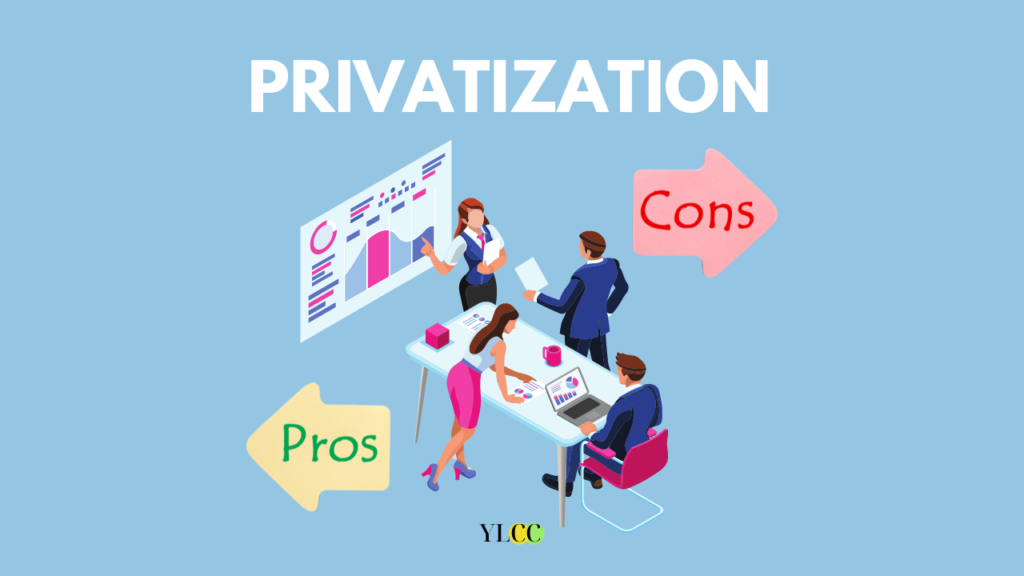
Privatization refers to the process of transition where publicly-owned business, operation or property becomes owned by private persons or non-governmental party. Under this process, companies trading publicly are taken over by few peoples and general public is barred from taking its ownership. The stock of a company undergoing privatization process gets removed from stock market as it is no longer listed and start using word ‘private limited’ in its name.
In most free economies like India, there is a divided opinion regarding privatization. While some believe that privatization is the only long-term solution to managing assets, others look to hold the government accountable in these manner in the light of being a ‘welfare state’. Thus the latter consider privatization to be evasion of responsibilities.
This article aims at objectively analyzing the pros and cons of privatization. Read on!
Pros

- Better Performance
It is a known fact that when measured in terms of overall performance, private corporations are far ahead of their government-owned counterparts. Private companies are well structured and funded, and every individual knows their role. Moreover, employees are incentivized to perform their role to perfection. Independent from the restrictive and corrupt practices at government workplaces, private corporations emphasise on productivity and outcomes which lead to optimized performance.
- Efficient Customer Service
For a number of reasons, private companies are always under the pressure to deliver a superlative customer experience. This is usually in stark contrast to government organizations where customer satisfaction is not a priority and is further worsened by factors like red tapism, etc. This unnecessary bureaucratic hassle is a massive inconvenience for customers.
- Elimination Of Political Intervention
Excessive political oversight can lead to unnecessary complications and create an atmosphere conducive to corruption and inefficiency. Private corporations which are controlled by directors and investors are free from such impediments and can therefore function more freely.
- Increased Competition
Sectors which are primarily run by government organization enjoy a large degree of monopoly in the market which is unhealthy for the economy as well as the market. Privatisation leads to the entry of new players in the market which leads to increased competition and accelerated growth for that sector. For example, the arrival of Reliance Jio revolutionized the telecom industry and compelled competitors to offer better rates. As such, all governments should try and promote a competitive market and discourage monopoly.
- Greater Investment
A major advantage of promoting privatization is the greater scope for investment which aids overall growth. More funds for any private organization translates into better management, expansion, innovation and generation of jobs. This has a positive impact on the entire society.
Cons

- Problem of Controlling Monopoly
Most experts believe that monopoly by private companies is as dangerous as government companies, if not more. Since private players have a profit-centric approach, a monopoly could lead to unrealistic tariffs and large-scale exploitation of the masses. This is particularly risky when essential sectors like water and electricity are involved.
- Concentration of Wealth
In absence of government schemes subsidizing essential commodities for the economically weaker sections, they can be thoroughly deprived. At the same time, large amounts of wealth will be amassed at the hands of already rich people. This shall in turn lead to an economic gap that is incongruent with the socialistic principles in our Constitution.
- Accountability
As compared to government organisations where people can expect some degree of accountability through mechanisms like Right To Information, private companies are almost immune to accountability. The common man can in no way influence policy decisions or hold private companies responsible for their actions. This can create a space for arbitrary policies which are not in public interest.
- Public Interest
Privatization may prove to be against greater public interest as private players are often concerned more about their own financial gains over and above general welfare. This can be a significant disadvantage, especially in monopolistic situations.
Thus, in the light of pros and cons of privatization, it becomes a rational inference to note that governments and legal frameworks in general must attempt to secure some parity between government organisations as well as private corporations. This mixed system is very much at work in India where in almost all sectors like health, education, electricity, etc. government services and private companies co-exist in harmony.
YLCC would like to thank Riya Gupta for her valuable inputs in this article.






